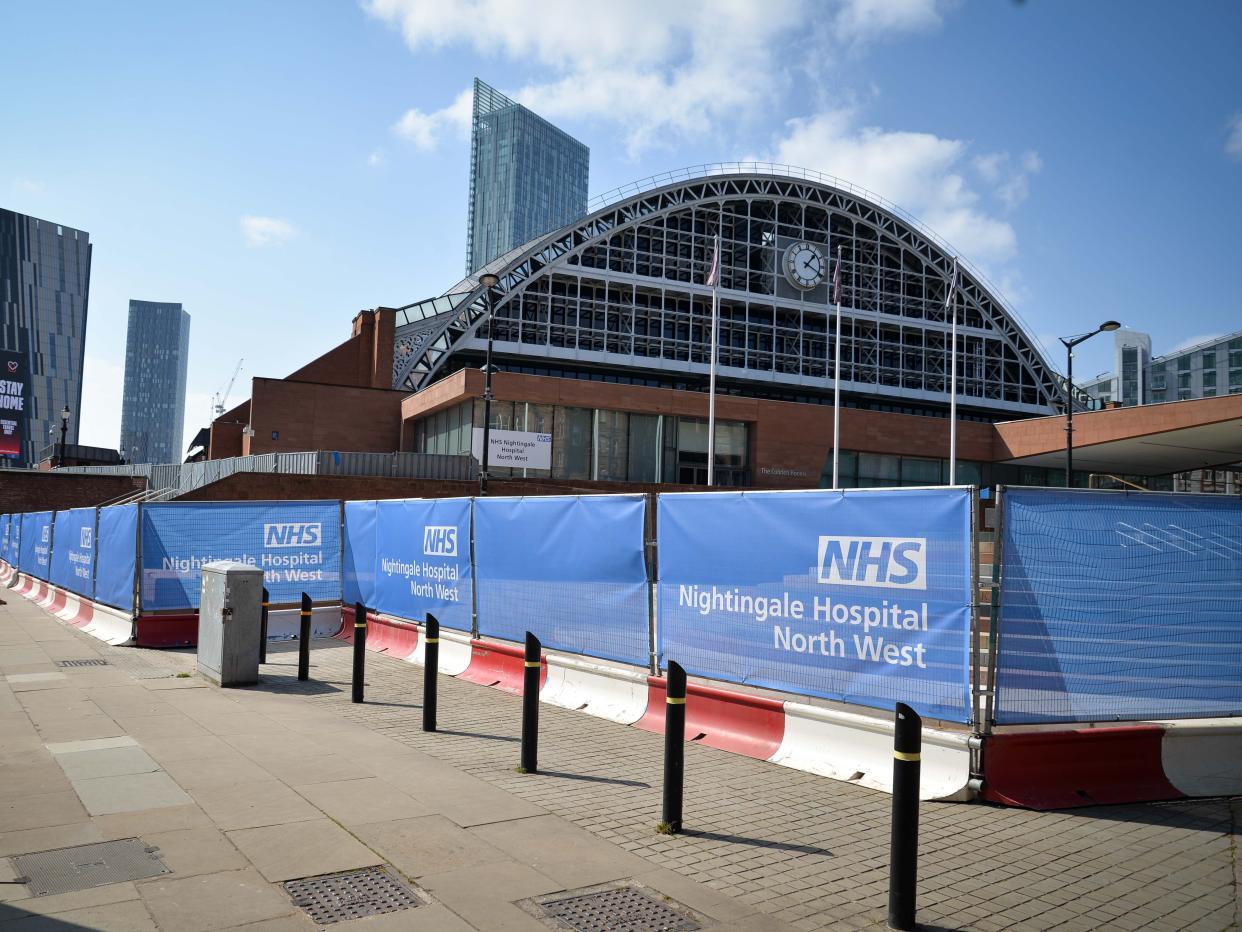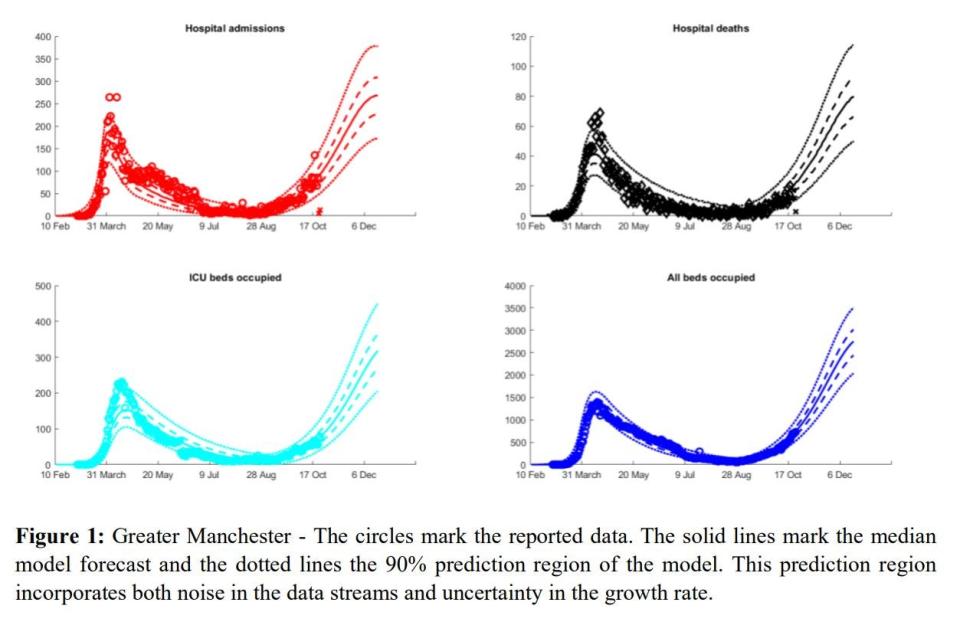Leaked report reveals Manchester hospitals set to open makeshift ICUs as Covid patients to outstrip number of beds within days

Operating theatres could be turned into makeshift intensive care wards as early as next week across Greater Manchester as hospitals there face running out of their normal critical care beds due to the surge in coronavirus patients.
A leaked internal NHS report, seen by The Independent, has warned hospitals in the region could see 371 patients in intensive care by the end of November, 100 more than the region’s 271 capacity.
This would force hospitals to activate their “surge” plans to open up more intensive care beds by redeploying nurses and doctors to look after patients in closed operating theatres re-fashioned as makeshift intensive care units.
While this will mean no patient is denied a ventilator, it will have a knock on effect on other patients waiting for surgery – with widespread cancellations possible.
Hospitals have also drawn up plans to move patients around the region if necessary to prevent one area becoming overwhelmed.
One intensive care doctor in the region said: “Bed use in hospitals is increasing as predicted across the board. Wigan is really struggling.”
They said the problems now being seen in Manchester “should be a canary to other regions as to what to expect”.
The leaked report said most of the regions’ hospitals have already seen the numbers of coronavirus patients exceed 20 per cent of their total bed capacity and this is expected to rise to 30 per cent within weeks.
According to the analysis, the region is closely tracking a worst-case scenario trajectory and has been since the start of October.
If the pattern holds, the report warns, the region will see 2,975 coronavirus patients admitted to hospitals by 30 November, 60 per cent of the region’s 4,800 total beds.
The leaked report also warns the area could see up to 100 deaths a day by the start of December.
Greater Manchester was at the centre of a political row between the government and Manchester mayor Andy Burnham who refused to agree to the area going into the tier 3 alert level without more funding support. Tougher restrictions were imposed on the city on 23 October.

The city’s Nightingale Hospital at the Manchester Central conference centre is being prepared to take non-Covid patients who are almost ready to leave hospital to try and help free up extra beds, in the coming week. It will be staffed mainly by agency nurses.
During the first wave of the virus, Manchester hospitals did not run out of intensive care beds, seeing a peak of 226 patients in critical care on 14 April. If the region stays on the current trajectory that will see the area exceed the first wave peak by more than 145 patients.
The internal report is an analysis of expected bed demand from Covid-19 patients.
Its key conclusions were: “Most trusts have breached 20 per cent acute bed demand and they are about to breach 30 per cent demand within the next couple of weeks.
“Most trusts (except Manchester University NHS Foundation Trust) have breached 90 per cent ICU bed demand and they are about to exceed the full capacity next week.”
It added: “The aim of this exercise is to predict bed demand from Covid-19 positive patients across Greater Manchester, in order to optimise usage of beds across the region and maintain as much business-as-usual as possible.
If ICU bed demand is at risk of being overwhelmed, most hospitals plan to close operating theatres and redeploy theatre staff to care for ventilated patients, under NHS surge planning. This was done during the first wave, when many surgical theatres and recovery areas were converted into wards.
“The scenarios below are indicative of what bed demand might look like over the coming weeks. For the next couple of weeks these should be in a reasonable ballpark," the report added.
"However, looking further ahead the numbers are far less certain, due to issues with trying to estimate the growth rate.”
As well as highlighting overall demand, the report also looks at individual hospitals and warns some will see their overall bed demand, even on a best case scenario, exceed what is available.
Of particular concern is the Wrightington, Wigan and Leigh Teaching Hospitals Trust which could see 540 coronavirus patients needing a bed by the end of November, with only 411 available.
The Pennine Acute Hospital Trust could also see Fairfield General Hospital in Bury overwhelmed with 340 Covid patients by the end of November, 74 more than the 266 capacity.
In a positive development, the report said Manchester University NHS Foundation Trust had seen a fall in admissions in the week to 26 October, adding this “indicates that the curve might be flat in coming weeks.”
The increase in Covid patients in Liverpool, which has been one of the worst affected areas, has also flattened out in recent days. This is in-line with the ‘lampshade’ scenario presented to the government by scientific advisers which warned of a longer but flatter second phase of infections lasting until March.
A spokesperson for the Greater Manchester Health and Social Care Partnership said: “We are seeing increased admissions, increasing numbers of people in general hospital beds with Covid-19 and more people in high dependency / intensive care with Covid-19. However, it is important to say firstly, that we are able to increase the number of HDU/ITU beds significantly above the ‘normal’ number if we need to. Secondly, that our hospitals are working together across Greater Manchester to ensure there is hospital care for those who need it anywhere in the city-region, and thirdly, that we are working collectively to minimise the risk of having to defer people’s treatment and operations.
“We also have the ability to use the newly opened NHS Nightingale North West should that be needed.
“We continue to do all we can to look after and care for people in Greater Manchester though we would stress that everyone has a role to play. It’s essential that we all follow the guidance - washing our hands regularly, maintaining social distancing and wearing face coverings when needed. If we are to slow the spread of the virus, it is essential that we all work together to protect ourselves and our communities.”
Read more
NHS leak shows London hospitals starting to feel coronavirus pressure
NHS leak shows London hospitals starting to feel coronavirus pressure
NHS to target risk of Covid outbreaks after watchdog investigation


